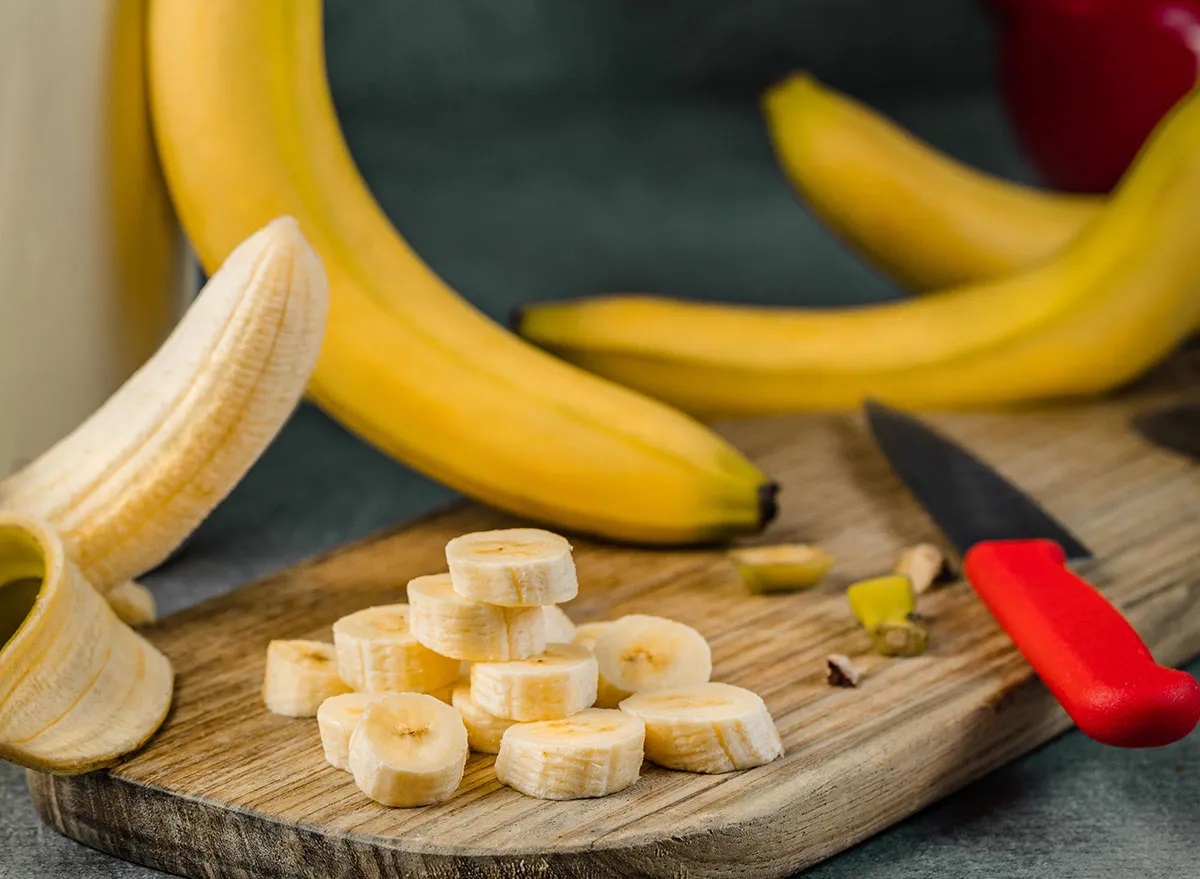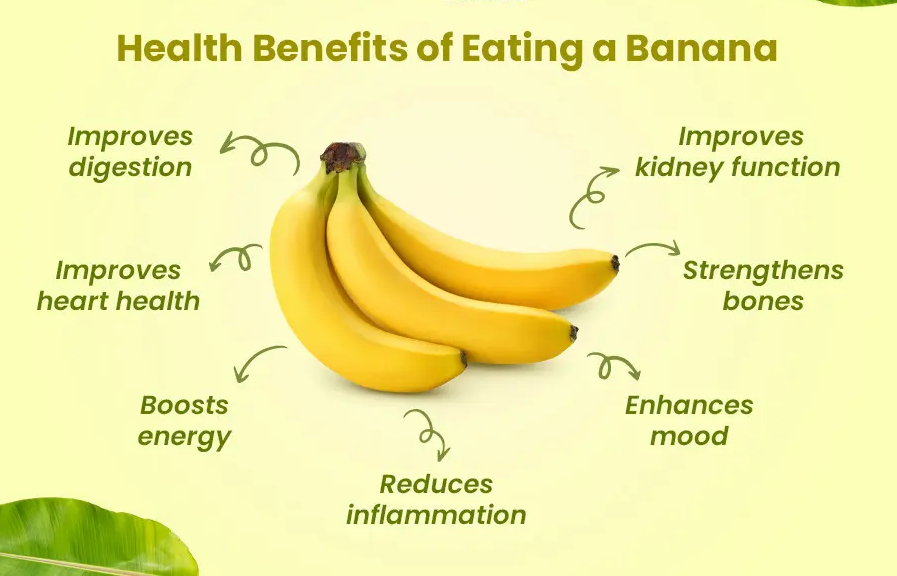
Bananas are one of the most popular and accessible fruits worldwide. But have you ever wondered whether eating them every day is a good idea? Are the health benefits worth it, or could there be hidden risks? With their sweet taste and convenience, bananas are a staple in many diets. But how much should you be eating to enjoy all the benefits without overdoing it?
Let’s break down everything you need to know about eating bananas daily, from their nutritional value to potential risks and how many you should actually consume. This guide explores the health benefits, risks, and the recommended intake of bananas for a balanced, healthy diet.
Nutritional Profile Of Bananas
Bananas are packed with nutrients that support overall health. Here's a quick breakdown of what makes bananas a nutritional powerhouse:
- Calories: 105 kcal per medium-sized banana (118 grams)
- Carbs: 27 grams (g)
- Fiber: 3 g
- Fat: 0.3 g
- Protein: 1 g
- Vitamin C: 10 mg (11% of the Daily Value)
- Vitamin B6: 0.43 mg (25% of the Daily Value)
- Potassium: 422 mg (9% of the Daily Value)
- Manganese: 0.32 mg (14% of the Daily Value)
- Magnesium: 32 mg (8% of the Daily Value)
These nutrients are key for maintaining energy levels, muscle function, and heart health. But bananas don’t just provide macronutrients-they also contain beneficial plant compounds that may help reduce inflammation and support immune health.
Related: Anti-inflammatory Diet Basics - Simple Steps For A Healthier Life
Health Benefits Of Eating Bananas Every Day
1. Boost Your Energy Naturally
Need a quick pick-me-up? Bananas are an excellent source of carbohydrates, the body’s main fuel source. With vitamins like B1, B3, and B6, bananas help your body convert food into energy, making them a great choice for an afternoon snack or a pre-workout fuel.
Pairing them with a protein source, such as yogurt or a handful of almonds, helps maintain stable energy levels and avoids the blood sugar crash that can happen with carbs alone.
2. Improve Heart Health
Bananas are rich in potassium, a mineral crucial for heart health. With just one banana, you get about 422 mg of potassium-around 9% of your daily needs. Potassium helps regulate blood pressure, supports proper muscle function, and is essential for heart health.
The DASH diet, often recommended for those at risk of heart disease, includes potassium-rich foods like bananas to help lower blood pressure.
3. Support Digestive Health
Bananas are a great source of fiber-especially pectin, which is known to aid digestion. Fiber helps keep the digestive system running smoothly and can prevent constipation.
In addition, bananas contain resistant starch, a prebiotic fiber that feeds the healthy bacteria in your gut, contributing to a balanced microbiome.
4. Improve Mood And Mental Health
Bananas contain vitamin B6, which plays a key role in the production of neurotransmitters like serotonin and dopamine. These chemicals are important for regulating mood and preventing depression.
Studies have shown that a deficiency in vitamin B6 may lead to mood disorders, so getting enough from food like bananas can help maintain emotional stability.
5. Aid Weight Management
Bananas are satisfying without being high in calories. The combination of fiberand resistant starchhelps keep you feeling full longer, which can curb cravings and prevent overeating.
Though bananas alone aren’t a miracle weight-loss food, when included in a balanced diet, they can help support weight management by reducing unhealthy snacking.
Read Also: Is Banana A Man-Made Fruit Or Nature’s Creation?
Risks Of Eating Too Many Bananas
While bananas are generally healthy, it’s important to consume them in moderation.
1. Potassium Overload
Potassium is essential for proper bodily function, but too much can be harmful. For most healthy individuals, eating bananas every day won’t cause potassium toxicity.
However, people with kidney diseaseshould be cautious, as their kidneys may not filter excess potassium efficiently, leading to hyperkalemia (high potassium levels), which can cause serious heart problems.
2. Blood Sugar Spikes
Bananas, especially when ripe, are higher in sugar. For those with diabetesor pre-diabetes, consuming large quantities of ripe bananas may cause a spike in blood sugar. It's important to balance banana intake with other foods that help stabilize blood sugar levels, like healthy fats and proteins.
3. Nutrient Imbalance
Though bananas are rich in several essential nutrients, they are low in protein, fat, and calcium. Relying too heavily on bananas could lead to nutrient imbalances.
Be sure to balance your diet with other sources of protein and healthy fats to ensure you’re getting all the nutrients your body needs for optimal health.
How Many Bananas Should You Eat Per Day?
Moderation is key. For most healthy people, 1-2 bananas per dayare perfectly fine and offer all the health benefits without the risk of overconsumption. If you are very active, you may need more to replenish your energy levels and provide adequate potassium.
But remember, bananas should be part of a balanced diet that includes a variety of fruits, vegetables, and other nutrient-dense foods.
If you have a specific health condition, such as kidney disease or diabetes, it’s important to discuss your banana intake with your healthcare provider to avoid complications.
You Might Like: Easy And Delicious Gluten-Free Banana Muffins Recipe
Bananas And Special Health Conditions
Bananas are generally safe for most people, but certain groups should exercise caution:
- Diabetes: Bananas can affect blood sugar levels, so individuals with diabetes should monitor their intake, particularly ripe bananas that are higher in sugar.
- Kidney Disease: People with kidney disease should avoid high-potassium foods, including bananas, to prevent potassium buildup, which can cause serious health issues.
- Heart Conditions: For most people, bananas help regulate blood pressure, but those on specific medications may need to limit potassium intake to avoid complications.
If you fall into one of these groups, consult your doctor for personalized advice on banana consumption.
FAQs
Can Eating Bananas Help With Muscle Cramps?
Yes, potassium helps regulate muscle contractions, and bananas are a great source of potassium. If you’re prone to muscle cramps, eating a banana can help replenish potassium levels and prevent cramps.
Are Bananas Good For Your Skin?
Yes, the vitamins and antioxidants in bananas, especially Vitamin C and manganese, promote healthy skin, reduce wrinkles, and fight free radicals that can lead to skin damage.
Can I Eat Too Many Bananas If I Have Diabetes?
While bananas are healthy, consuming too many at once can cause a rapid rise in blood sugar due to their carbohydrate content. It’s best to monitor your intake and pair bananas with protein or fat to slow sugar absorption.
How Many Bananas Should I Eat Per Day For Weight Loss?
One to two bananas per day, as part of a balanced diet, is a healthy amount. Bananas can aid in weight loss by helping you feel fuller for longer due to their fiber content, but they should not replace other essential food groups.
Can Bananas Aid In Digestion?
Yes, bananas are rich in fiber and pectin, which support healthy digestion by promoting regular bowel movements and feeding beneficial gut bacteria.
Conclusion
Bananas are an incredibly nutritious fruit that offers numerous health benefits, including increased energy, improved heart health, and better digestion. Eating 1-2 bananas per day is a great way to add vitamins, minerals, and fiber to your diet.
However, it’s important to practice moderation and ensure that you’re not over-consuming bananas to the detriment of other essential nutrients. As with any food, balance is key to maintaining overall health and well-being.
What’s your banana intake like? Do you eat them daily or in moderation? Share your thoughts in the comments below!

